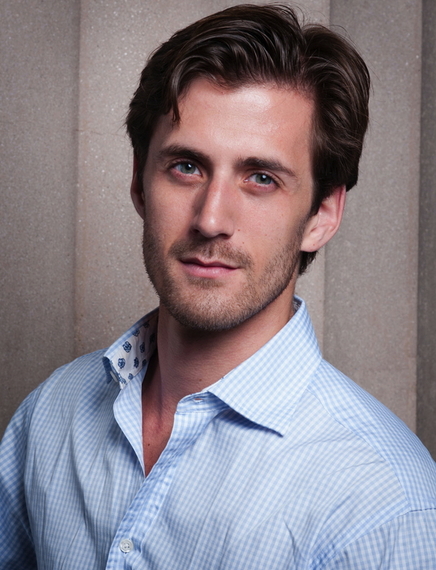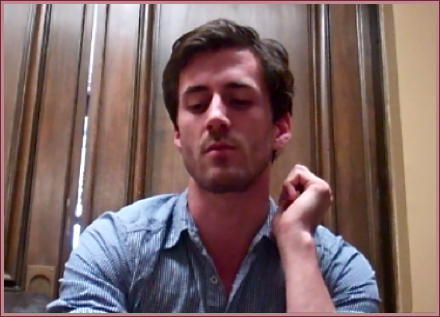This coming Sunday afternoon the second program of the very popular Schwabacher Debut Recitals takes place in the Martin Meyer Sanctuary at Temple Emanu-El in San Francisco. Tagged as In the Memory Palace, the recital is presented by Steven Blier, the artistic director of the New York Festival of Song. Mr. Blier will accompany artists from the Adler Fellowship Program -- Maria Valdes, Zanda Švēde, A.J. Glueckert and Hadleigh Adams. The selections will include songs by English composer Frank Bridge, Brazilian born Heitor Villa-Lobos, Broadway's Stephen Sondheim and popular singer/composer Smokey Robinson. The featured work is Gabriel Kahane's The Memory Palace which will be sung by baritone Hadleigh Adams. I recently met with Hadleigh to talk about this unusual work which deals with emotional connections to physical space.
"I'm always very cautious to use the words Pop and Classical," said Hadleigh, "because you're bound to offend someone. In The Memory Palace, there's a kind-of narrator. One song is set in World War II, another is about two people reminiscing about when the Underberg Building, a kitchen supplies building in New York got torn down. There is a beautiful line where the girl says, 'I want to watch them tear down that building with you. Then watch them watch you tear me down, too.' The second is a song about Benjamin Britten, Carson McCullers and W.H. Auden during the war and how London was calling them cowards and how, when the bombs began to fall, they couldn't hear them, but they felt them. So, it's about physical space and loss. It's a beautiful song cycle. It's going to be very interesting, because if you played and sang the cycle a certain way, it could sound like Billy Joel. It's just simple and beautiful and lovely."
Recitals featuring song cycles, i.e., German lieder, French mélodie, English art song, are standard fare with all classical vocalists, particularly those whose primary association is in the operatic world and who can draw a loving crowd to a smaller performance venue. For example, the recent Bay Area appearance by renowned operatic baritone Nathan Gunn performing the collected songs of Robert Schumann's Dichterliebe (The Poet's Love) and accompanied by his wife Julie, a brilliant pianist. For some patrons, it is the artist, and not necessarily the repertoire, that sells the ticket. On the other hand, there is a growing fervor for contemporary American composers whose works, including song cycles, are attracting young classical singers in an era where English diction is enjoying a comeback.
"One of the first projects I ever did," said Hadleigh, '"was the New Zealand premiere of the AIDS Quilts Songbook. Doing a modern work like that, which had a lot of Chris DeBlasio, who was at the verge of that amazing kind of crossover work and making it come alive through a classical medium -- was thrilling and a real privilege. The Memory Palace is a very different work. The words are exquisitely structured. They represent and look at loss through physicality and space."
"I adore the intensity of a recital, when I'm present with the singer. Especially with art song, when it's you and a pianist. You're making something together and you push and you pull -- that's when you really create something. My former teacher would always call it 'Sternestunde' -- that star moment when you and the audience are one, and how rare that is. There's a chance for that in the air. It's gripping and everyone feels it. I'm also one of these people who gets a lot of criticism for saying I would love to have supertitles at lieder concerts. I would love them!
To have one whole verse slightly to the side. Especially with Schubert, you're doing lyrics by Goethe and poets like that. You can't get the gist. You can't get the immense sadness, the 'doloroso' of it all without knowing what they're trying to say. I studied at the Guildhall School of Music for three years. You do a lot of art song, more so than is done in places here, and a lot of British art song. It's a huge component of the course. A Shropshire Lad by George Butterworth that I adored, once I figured out how to stop yelling it. But American art song isn't done quite as much, because people don't quite know how to... "
"How to latch onto it," I interjected. "I have one friend who will urge me to listen to a recording by a particular British singer doing A Shropshire Lad, but that's about it. But I will come to this recital -- first, to hear you, and along the way become familiar with this new song cycle and its composer, Gabriel Kahane. Who knows? Maybe the first recording of it will be sung by you! But my first impression of it will always be associated with you, through your sound, through your whole package."
"My passion above all is to tell a story," he answered. "That may sound very generic, but it's not. I love singing a great deal. I love the form of opera and recital. It's so much about the audience's desire to want to come with you. I played Christ in the St. Matthew Passion. It was at the National Theatre in London, directed by Jonathan Miller. He was doing a pre-concert talk. Someone asked him why he thought art was so important. It was a very generic, open-ended question.
He responded that people always say that art takes you to a place outside of yourself where you are transformed. But he thinks the complete opposite. He said, "Art takes you to a place so deep within yourself that everything that has formed you and your opinions of the world has to be examined and looked at. You can't see anything which transports you through any eyes other than your own." It was one of those moments where I remember exactly where I was sitting and what was in front of me. It really made sense to me. My aim is to take people deep inside themselves, to feel something so real, but, at the same time, outside of themselves."
This coming season at San Francisco Opera, Hadleigh appears in Tosca (a Jailer), La Traviata (the Marquis), Madama Butterfly (Imperial Commissioner), La Cenerentola (cover for Dandini), La Bohème (cover for Schaunard), Partenope (cover for Ormonte), La Bohème for Families (Schaunard). I asked him about his plans after his association with the Adler Fellows. Who is knocking on his door?
"Tumbleweeds! As an Adler Fellow we get a great opportunity to sing for a lot of agents. A lot of things are on the table at the moment. The options as a non-U.S. citizen -- I stay and apply for my O-1 Visa and I work in my field and then eventually I could apply for my citizenship. I could look at going back to the UK, to France, or festing in Germany, and a few others. It's a nerve-wracking thing, knowing what route to take. I'm the first Kiwi to be an Adler, which I'm very proud of. The route I've taken has been very strange. But it's because it's the one that just felt right. Not because it's the one that other people have done."
Click here to get better acquainted.

